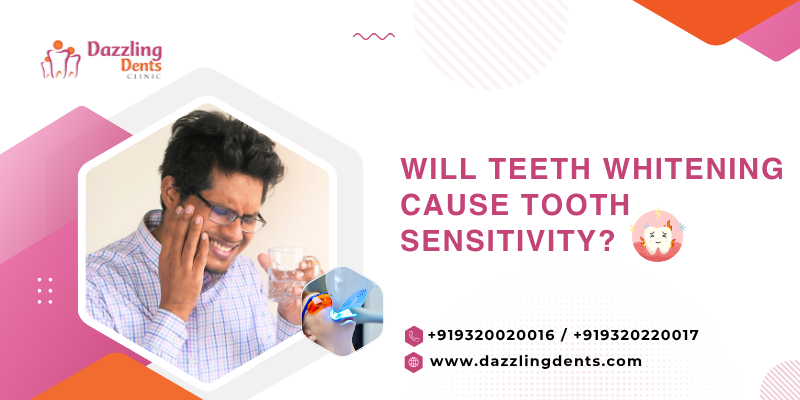


You’ve got a big event coming up; maybe it’s a friend’s wedding, a much-anticipated job interview, or that long-overdue college reunion where everyone’s going to be sizing up everyone else’s glow-up. You look in the mirror, flash a smile, and… notice your teeth aren’t as bright as they used to be. A couple of years of coffee runs, evening chai at your favourite tapri in Dombivli, and weekend treats have left them a little dull.
You start searching for teeth whitening in Dombivli and find plenty of options: from home kits to professional in-office whitening. That’s when another thought strikes: Will whitening make my teeth sensitive? No one wants to swap a dazzling smile for the uncomfortable “electric shock” feeling when eating ice cream.
In this blog, we’ll talk about:
By the end, you’ll know exactly what to expect when you choose Dazzling Dents Dental Clinic with Dr. Pankaj Desale for your whitening session and why your smile will thank you.
While the internet is full of “miracle” home remedies (from baking soda to lemon juice), nothing comes close to the precision and results of in-office teeth whitening. Professional whitening isn’t just about getting whiter teeth; it’s about doing it safely, evenly, and without harming your enamel.
Here’s how the whitening teeth process works in a clinic:
This step-by-step approach is what makes in-office whitening far more effective and safer than any whitening toothpaste or DIY kit.
Tooth sensitivity after whitening is fairly common, but it’s important to understand why it happens. The whitening gel works by temporarily opening tiny pores in your enamel so stains can be lifted. While these pores are open, your teeth can be more responsive to hot, cold, or sweet stimuli.
For some, this sensitivity feels like a mild tingle; for others, it’s a short-lived “zing” sensation. It’s more likely if:
However, when whitening is done in-office, your dentist will take preventive steps, like using desensitising agents before and after treatment, to keep discomfort minimal and temporary.
The temptation of cheap home kits or online “instant whitening” products is real, but they often come with risks. In-office whitening under the care of a professional like Dr. Pankaj Desale offers benefits that go beyond speed:
Simply put, professional whitening isn’t just about getting results; it’s about getting them without long-term damage.
Even with the safest process, a little temporary sensitivity can happen. Luckily, it’s manageable:
Most patients find that any sensitivity fades within a day or two, and the results far outweigh the brief adjustment period.
One of the best things about professional whitening is how long it can keep your smile bright. With good oral hygiene and a few lifestyle adjustments, you can enjoy the effects for many months, sometimes even years.
Tips for maintaining your results:
Q1. What is the cost of getting your teeth whitened?
The cost varies depending on your starting tooth colour, the whitening method, and how many sessions are needed. In-office whitening offers the fastest and safest results, and your dentist can give you an accurate estimate after a consultation.
Q2. Is teeth whitening safe?
Absolutely, when performed by a qualified dentist. Professional whitening uses carefully regulated gel concentrations, gum protection, and expert techniques to keep your enamel healthy while removing stains.
Q3. Is teeth whitening permanent?
No whitening lasts forever, because teeth naturally pick up stains over time. However, with good oral care and occasional touch-ups, you can maintain a bright smile for a long time.
Q4. Is teeth whitening painful?
The whitening procedure itself is painless. A small percentage of people may feel mild sensitivity afterward, but it’s temporary and easily managed with sensitive toothpaste and avoiding extreme temperatures for a couple of days.
Q5. Can yellow teeth be white again?
Yes. Professional whitening can significantly improve teeth discolouration caused by stains, diet, or age. While results vary, most patients see a dramatic difference after just one in-office session.
If you’ve been curious about teeth whitening in Dombivli but worried about tooth sensitivity, the key is choosing professional in-office whitening. Under the care of Dazzling Dents Dental Clinic and Dr. Pankaj Desale, you’ll get a safe, customised whitening teeth process that brightens your smile while keeping you comfortable.
Book your appointment today and take the first step toward a confident, radiant smile.